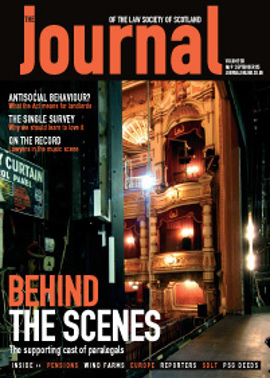Select band

If the myth of lawyers as innately conservative, stuffy individuals still requires to be debunked, the involvement of Scottish solicitors at the cutting edge of Glasgow’s thriving music industry surely does that.
Operating at its hub is Maclay Murray and Spens’ Murray Buchanan. As Scotland’s only music lawyer his work attire is suitably more Skid Row than Savile Row, essential because he will often be found cutting his deals late at night over a pint in King Tut’s.
Meanwhile, three solicitors have founded a recording company specialising in electronic music, as a diversion from their daily practice.
Not predetermined
Buchanan’s example shatters the notion that leaves many trainees hamstrung in their career choices – that your traineeship intrinsically determines the remainder of your career, making a big switch in direction nigh on impossible. Having started doing crime and personal injury work, his determination to work as a solicitor in the music industry – and in his own way follow his family into the industry (his brother is Blue Nile vocalist and songwriter Paul Buchanan) – saw him establish contacts in London and with a dogged single-mindedness eventually land a job with the music publishing division of Warner Music.
Leaving a high street Glasgow office for a plush office overlooking Park Lane and Hyde Park, he was thrown straight into doing deals to acquire and exploit the copyright in songs as opposed to recordings.
“The company owned songs by the likes of Radiohead, Eric Clapton, REM, Madonna, Cole Porter and the Gershwins. I negotiated deals between the company and the writers or their heirs. Sometimes I would be negotiating to acquire a catalogue of songs that had already been written, and other times I would be charged with signing songwriters themselves to exclusive contracts, negotiating with their lawyer over royalty rates and advances. The terms would vary depending on a number of factors including whether the songwriter was also a performer and recording artist. Once the commercial terms were agreed I’d draw up the contract and then it would be a lot of champagne and photographs to mark the conclusion of the deal. I would then negotiate licensing the rights on to third parties. The company would be entitled to royalties every time a song was sold on CD, performed in public (either live or as a recording) or used in adverts or films.”
From there he moved to BMG Music Publishing, owners of the songs by Coldplay, Keane and the Bee Gees, and employers of Simon Cowell. Then he joined V2, the organisation set up by Richard Branson five years after selling Virgin records.
Starting up over again
“By that point I had built up knowledge of music publishing and was keen to acquire experience of the recording industry. People often don’t appreciate the distinction between the two sectors, but they operate at arm’s length and relate to separate forms of copyright.”
At V2, then very much in start-up mode, he was in charge of structuring the day to day legal and business affairs of the company’s dozen or so subsidiaries and licensees covering territories outside the UK. Once up and running, the pressure was on to sign artists and songwriters to provide a product to sell. “Music is a very speculative business at the best of times and as a new company we didn’t have an existing catalogue generating revenues, so we relied entirely on founders’ start-up capital.”
After six years in London, Buchanan was keen to return to Scotland but could find no obvious route back. Preparation for setting up on his own led to a chance meeting with Maclays’ then head of IP Fiona Nicholson and he was recruited for a post whose remit defied conventional description.
“The practice was slow to begin with. I had to raise awareness within the marketplace of what I had to offer, and create a demand for my services. There was a void because those who needed legal advice were either using lawyers in London and paying more, or using no-one at all and invariably getting into difficulties.”
Four years after joining, his unit is up and running and “inundated with work”. He has kept his London connections as well as developing business in the regions and outside the UK. He has now branched out into related sectors such as film, television and games.
Part of the scene
He goes to see bands on almost a nightly basis, which he admits can take its toll but says it’s an essential part of generating business. “It’s all about visibility. It’s vital to tap in to the talent before there’s interest from record companies. There’s now a sense of goodwill about keeping the ancillary services attached to the music industry in Scotland rather than having it all done in London.”
Some of Buchanan’s clients may not be familiar to Journal readers. Ayrshire rock band Biffy Clyro, dance act Mylo and folk singer Karine Polwart are all highly regarded but may not register on your radar as you drive to work listening to “Wake up to Wogan”. However Buchanan points out that he never expected to get instructions from established stars.
“Once a band is up and running, their lawyer has fairly limited involvement until it comes to renegotiating their recording and publishing contracts.”
Making a career out of his passion has largely been down to determination, says Buchanan. “I’m out and about working when most people are at home relaxing and resting. For many of the people I mix with, I’m the only lawyer they know. They want me to be one of them, speak their language and have a less formal relationship. I go to where they are playing, or go to the studio where they are recording. But clients do not abuse the less formal nature of the relationship.”
Ambition realised
Separately, Buchanan’s colleagues Brian Moore and David McGowan, and David Beveridge of Macdonald Henderson have launched their own record label. Mighty Robot Recordings was set up in early 2004 with the aim of releasing “quality electronic music for the discerning ear”.
“Our first release was in December 2004, followed by another in April of this year. Both were by a Dutch artist called Ra-X. Rob Da Bank has played tracks from both releases on his show on Radio 1, and they have been garnering good reviews. Our next release will be out in early September and is a re-release of two classic tracks by a Scottish artist, Voigt Kampff, backed by a new remix by Freak Electrique, another Dutch artist. We’re very pleased with the quality of our releases so far and have several others lined up and ready to go”, says Moore.
As well as the three lawyers, there are two non-lawyers directly involved, in addition to friends who help out with design, sound mastering etc. It had been a longstanding ambition to set up a label, explains Beveridge.
“There are so many average labels putting out so many average records that we thought ‘We can do this, and we can do it better’. It was really just a question of getting round to it.”
So, does being a lawyer serve as an advantage to setting up a record label; is there a cross fertilisation between your parallel careers? “It helps with the obvious things like drafting the licence agreements for our artists, dealing with company secretarial matters etc. It also helps with day to day business affairs, because hopefully you’ve had enough problems come across your desk not to make elementary mistakes. We try and run the company properly and have regular board meetings, keep accurate minutes and so on.”
Don’t be labelled
It may be surprising that solicitors working in the pressurised atmosphere of a large commercial firm can find the time to devote to a time-consuming sideline such as running a record label. “We find the time, the same way as we find time to do everything else”, said McGowan. “A life without interests and passions isn’t really a life. Having five directors/shareholders who each do their little bit also helps.”
Nevertheless the typical images of lawyers and record label owners do not seem to fit naturally together. Are artists in the electronic music scene not suspicious of lawyers’ involvement?
“The artists and other people we deal with know us for other reasons before they find out, if at all, that we are lawyers”, says Moore. “It may, in part, be because the people who like the type of music we release are into it because of the music alone. There is no stereotype of what someone who likes this type of music should be like, and therefore little for people to be surprised at.”
The three do agree there is an element whereby running a business of their own helps them identify with clients who are coming looking for advice; they better understand the pressures clients are facing in trying to make a business work. “We worry about cash flow, distribution, IP rights, publicity and a dozen other things, just like any other business, big or small.”
Are colleagues supportive of their venture or do they view it as an idle distraction?
“I think we’re generally regarded as moderately eccentric so this didn’t come as any surprise to them”, says Moore. “A mixture of bemusement, exasperation and disinterest is probably the most accurate description.”
Roger Mackenzie is a solicitor and a former Deputy Editor of the Journal
In this issue
- Moving in society
- Pots and kettles
- Unseen force
- Licence to let?
- The cost of a puff
- Select band
- Cross-border disputes: a practical way forward?
- No hiding place
- Safe as houses?
- Close connection
- Another string to the bow
- The ultimate sanction?
- A right and its exercise
- In good company
- Out of bounds
- Scottish Solicitors Discipline Tribunal
- Website reviews
- Book reviews
- The single survey: why it should be supported
- Drafting deeds of conditions - a real burden?
- SDLT online service






